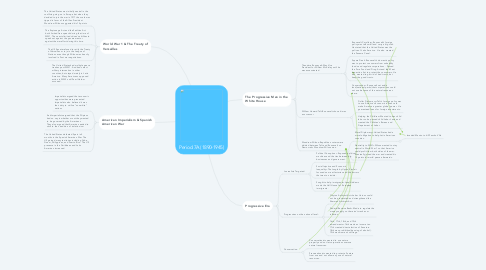
1. American Imperialism & Spanish American War
1.1. Imperialists argued that economic opportunities were presented Imperialists also believed it was their duty to civilize "non-white" nations
1.2. Anti-Imperialists argued that the Filipinos had no say in whether or not they wanted to be governed by the Americans They also argued that America needed to stick to their tradition of isolationism
1.3. The United States defeated Spain in 4 months in the Spanish American War. The US gained many territories including Cube, Guam, Philippines, and Puerto Rico. The US presence in the Caribbean and Latin American increased.
2. World War 1 & The Treaty of Versailles
2.1. The United States was initially neutral in the conflicts going on in Europe but when they decided to join the war in 1917 the scale was tipped in favor of the Allies. President Woodrow Wilson suggested his 14 points
2.2. The Espionage Act and the Sedition Act both limited free speech during the time of WW1. These acts limited citizen's abilities to speak out against the government or against the war effort during this time.
2.3. The US Senate refused to ratify the Treaty of Versailles or to join the League of Nations even though Wilson was heavily involved in Post war negotiations.
2.4. The United States had multiple peace treaties post WW1. And had select military intervention in other countries, but stayed mainly in Latin America. Many Americans opposed action in WW2 until Pearl Harbor occurred.
3. The Progressive Men in the White House
3.1. Theodore Roosevelt-Was Vice President for William McKinley until he was assassinated.
3.1.1. Roosevelt Corollary=Roosevelt's foreign policy was talk small and carry a big stick. He stated that the United States was the police of Latin America. He also created the Panama Canal.
3.1.2. Square Deal=Roosevelt's domestic policy was to protect consumers from unhealthy foods and regulate corporations. Passed the Pure Food and Drug Act and the Meat Inspection Act to protect the consumers. He also wanted to get rid of bad trusts, but keep the good trusts.
3.1.3. Conservation= Roosevelt set aside land(national parks) that corporations could not use because of the natural resources there.
3.2. William Howard Taft-Roosevelt chose him as a successor
3.2.1. Dollar Diplomacy=Taft's foreign policy was to use America's economic influence to make America a greater global power. He guaranteed loans for foreign investments.
3.2.2. Helping the Children=Wanted to ban child labor so he passed child Labor Laws and created the Children's Bureau and Department of Labor.
3.3. Woodrow Wilson-Republican voters were divided between Taft and Roosevelt so Democratic Woodrow Wilson won.
3.3.1. Moral Diplomacy=United States had a moral obligation to help Latin American countries.
3.3.1.1. Invaded Mexico to kill Pancho Villa
3.3.2. Neutrality to WW1=Wilson wanted to stay neutral in World War 1 so that America could profit from both sides of the war. Eventually joined the war and created his 14 points for world peace afterwards.
4. Progressive Era
4.1. Journalists Targeted:
4.1.1. Political Corruption= Exposed political machines and the ties between big businesses and government.
4.1.2. Social Injustice and Economic Inequality=The Jungle by Upton Sinclair focused on meat factories and the horrors that went on inside.
4.1.3. Sought to help immigrants=Jane Addams made the Hull House for European immigrants.
4.2. Progressives on the national level:
4.2.1. Clayton Antitrust Act=Labor Unions could not be prosecuted and strengthened the Sherman Antitrust Act.
4.2.2. Federal Reserve Bank=Made to regulate the money supply so there isn't crashes or inflation.
4.2.3. 16th, 17th, 18th, and 19th amendments=16th made an income tax. 17th created direct election of Senators. 18th was prohibition(banning of alcohol). 19th was women's suffrage.
4.3. Conservation:
4.3.1. Conservationists wanted to use nature properly and not let corporations overuse natural resources.
4.3.2. Preservationists wanted to protect all nature from use and not allow any use of natural resources.

